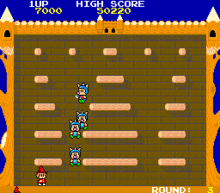The Fairyland Story
| The Fairyland Story | |
|---|---|
| Developer(s) |
Taito Tokai Communications |
| Publisher(s) | Taito |
| Director(s) |
M. Ogata M. Hatano |
| Designer(s) |
Kazutomo Ishida Hiroshi Tsujino |
| Composer(s) |
Y. Tsuchida Tadashi Kimijima |
| Platform(s) | Arcade, MSX, X68000, mobile, Microsoft Windows |
| Release |
Arcade
|
| Genre(s) | Platformer |
| Mode(s) | Up to 2 players (alternating) |
| Cabinet | Upright |
| Display | Raster, standard resolution |
The Fairyland Story (フェアリーランドストーリー Fearīrandosutōrī) is an arcade platform game released by Taito in July 1985. The game was ported to the Microsoft Windows, MSX and X68000 computers, and later was included in Taito Memories and Taito Legends 2 for the PlayStation 2 for the Xbox and the PC.
Gameplay

In the game, the player guides the little witch Ptolemy through a series of single-screen levels, the goal being to eliminate all enemies and proceed to the next level. Ptolemy's main weapon is her magic attack, which can turn enemies into cakes for a short while. While in a "caked" form, the enemies can be either be destroyed by further magic attacks or by being dropped off a platform, possibly squashing other enemies below. Squashing more than one enemy results in an award of more points and, sometimes, in extra bonuses. 2000 points are awarded for squashing an enemy below a cake, with each additional enemy doubling the amount of points awarded. If three or more enemies are killed at once in one spot, bonus coins appear in that spot which may be collected for additional points.
Ptolemy's enemies include typical fantasy beings like orcs, mages, ogres, and dragons. If Ptolemy takes too long to clear a level of a last remaining enemy, eventually that enemy will disappear without an award of points. If, however, Ptolemy takes too long to clear more than one enemy from the level, a flying devil appears that can kill Ptolemy by touching her, and it begins to follow her slowly. The devil is invulnerable to attack and the only way to survive is for Ptolemy to kill all remaining enemies. This game element is very similar to the "Beluga" or "Skel Monsta" fish that limit the time allowed for each level in the later Taito game Bubble Bobble.
Ptolemy's deaths are animated in different ways, depending on the enemy who kills her. She can sometimes collect some utility bonuses which increase her speed or the power and range of her magic for a short while, or offensive bonuses that, most usually, result in the cake-ification and destruction of all on-screen enemies. At various intervals between levels, an intermission screen appears during the game showing Ptolemy riding on the back of a large, flying green dragon. A message appears on each of these intermission screens, either congratulating the player or warning of some hazard in the next level. Many of these messages contain incorrect English idioms or grammar typical of Engrish.
The Taito game designers incorporated several elements from the earlier Taito game Chack'n Pop. The Stoner/Mighta wizards from Chack'n Pop appear as ghost-like phasing enemies in The Fairyland Story, and level 37 of the MSX port has an arrangement of platforms that are designed to appear like the Mr. Chack'n character from Chack'n Pop.
Reception
Reviewing Taito Legends 2, Kristan Reed of Eurogamer wrote The Fairyland Story "is a lot of fun - although lacks the two-player co-op fun, sadly. (...) Hugely addictive, though."[1]
Legacy
Ptolemy appears as a player character in Space Invaders DX (1994), Pop'n Pop (1998), Daifugo Party (2010), and Arkanoid vs. Space Invaders (2017). She and/or other The Fairyland Story characters also make cameo appearances in several other games, including Bubble Bobble (1986),[2] Rainbow Islands (1987),[3] Bubble Symphony (1994), Bubble Memories (1996), and Arkanoid DS (2007).[4] Many of the Bubble Bobble and The New Zealand Story gameplay elements, and even some graphics and bonuses, first appeared in The Fairyland Story.[5][6]
Notes and references
- ↑ Reed, Kristan (2006-03-31). "Taito Legends 2". Eurogamer.net. Retrieved 2015-06-27.
- ↑ Several of the magical bonuses are adaptations of, or are directly taken from The Fairyland Story. Ptolemy herself also appears as a bonus in the game.
- ↑ Magical Island, an unlockable eighth island, has enemies and other features drawn directly from The Fairyland Story.
- ↑ Ptolemy appears as the breakable block design of stage Beta-5.
- ↑ "The Ultimate Guide To The New Zealand Story". NowGamer.com. 2014-01-10. Retrieved 2015-06-27.
- ↑ "The Fairyland Story · Games of Our Lives · The A.V. Club". Avclub.com. 2006-09-11. Retrieved 2015-06-27.
External links
- The Fairyland Story at MobyGames
- The Fairyland Story at the International Arcade Museum
- Anthony Greulich's The Fairyland Story page with extensive info